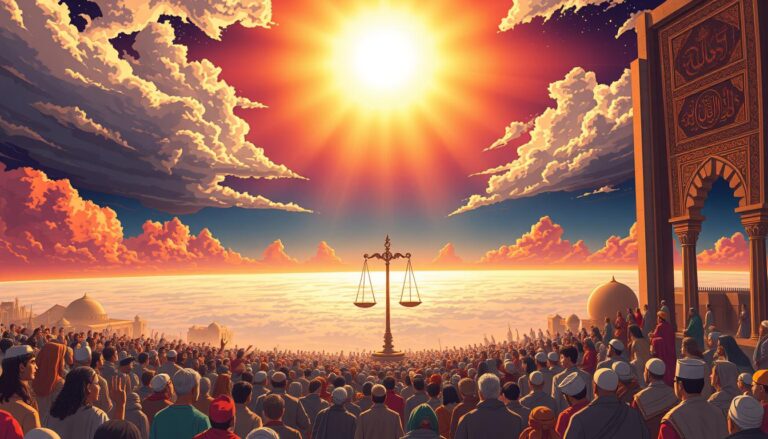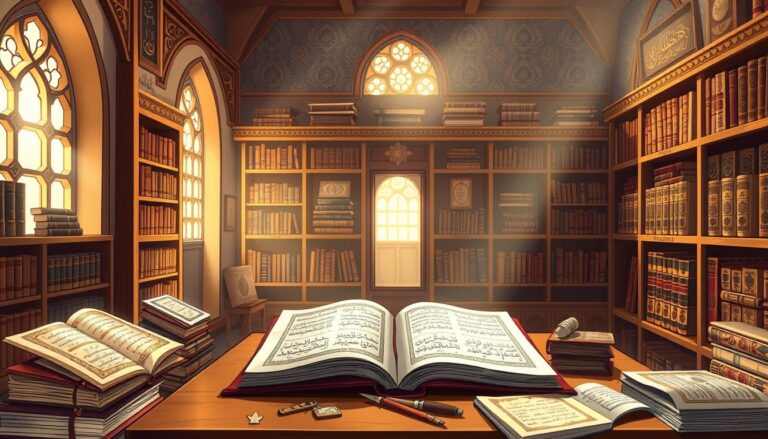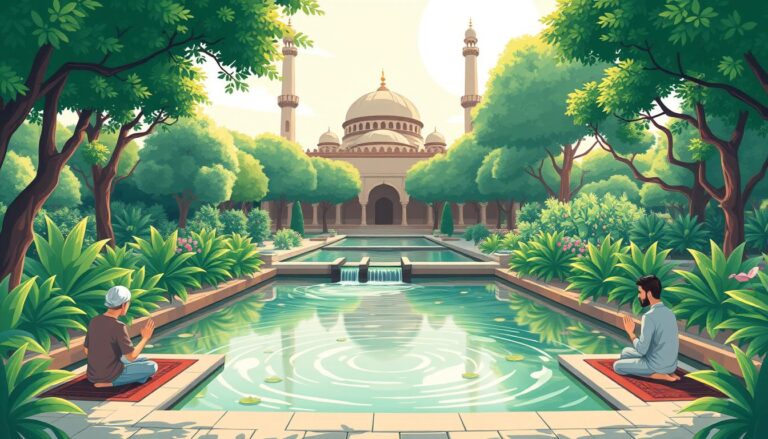What’s Next for Islam? Exploring Modern Muslim Thought
Can Islam keep up with the fast-changing world of the 21st century while staying true to its core values? This is a big question for Muslim thinkers today. They are trying to figure out how to balance tradition and progress in our global world.
Islamic reform movements are leading the way in rethinking Muslim modernism. As we look to the future of Islam, we see a mix of new ideas from scholars. They aim to connect old Islamic teachings with today’s world. This journey is not easy, but it could lead to a fresh Islamic conversation that meets the needs of today’s Muslims.
The Quran guides us on this path, reminding us in verse 49:13 of the need for unity and understanding. This idea is key for modern Islamic thought. It tells Muslims to connect with the world while staying faithful to their beliefs.
As we dive into modern Muslim thought, we’ll see how scholars are looking at old texts in new ways. We’ll also learn about the role of ijtihad (independent reasoning) and how globalization affects Islamic practices. This exploration will be enlightening and make us think deeply about the future of a major world religion.
Key Takeaways
- Islamic reform movements are reshaping Muslim modernism
- Contemporary Islamic philosophy bridges tradition and modernity
- The Quran encourages unity and understanding among diverse peoples
- Scholars are reexamining classical texts in modern contexts
- Ijtihad plays a crucial role in shaping new Islamic interpretations
- Globalization significantly impacts Islamic thought and practice
The Evolution of Islamic Thought in the Modern Era
Islamic thought has changed a lot over 1400 years. The Golden Age of Islamic Civilization, from the 8th to 14th centuries, was a time of great growth. It set the stage for the modernization and progress we see today.
Bridging Traditional Islamic Values with Contemporary Challenges
Today, Muslim thinkers try to mix old Islamic values with new challenges. Islamic Feminism is one movement that tries to update Islamic teachings for today. It keeps the core beliefs but tackles modern issues.
The Role of Islamic Scholars in Shaping Modern Muslim Thought
Islamic scholars are key in guiding Muslims through new times. They look to early figures like Imam Abu Hanifa and Imam Malik for guidance. Today, they apply Islamic teachings to modern problems.
Adapting Islamic Principles to Technological Advancements
Progressive Islam values knowledge and exploration. It follows the Qur’an’s call to seek knowledge. As technology grows, Islamic thinkers find ways to use it while staying true to their faith.
“Islam requires believers to deal justly in social interactions among people and integrate every aspect of life.”
The modern era shows how Islam adapts to change. By blending tradition with today’s needs, Islam guides millions of followers around the world.
Islamic Reform Movements: A Path to Progress
Islamic reform movements are changing the Muslim world. They mix old Islamic values with today’s challenges. The 19th century started this change as a response to Western colonialism.
Important figures in Islamic reform have made a big impact. Sir Sayyid Ahmed Khan, Muhammad Abduh, and Jamal ad-Din al-Afghani are leaders. They brought modern sciences into Islamic studies while keeping Islamic law important.
Today, Islam is blending old values with new ideas. This is seen in literature, arts, and talks on equality and freedom. Thinkers like Muhammad Iqbal and Fazlur Rehman want to use Islamic principles to solve global problems.
- Inclusivist-integrationist movement: Embraces beneficial Western knowledge
- Exclusivist-rejectionist movement: Takes an insular approach
- Modernist approach: Removes incompatible Islamic norms
Young scholars and activists are pushing for a more open Islam. They focus on social justice and human rights. They believe in using ijtihad to make Islamic law fit today’s world.
Contemporary Islamic Philosophy: New Perspectives
The world of Islamic philosophy is changing. It’s mixing old wisdom with new challenges. Islamic modernization is leading to new talks on ethics, knowledge, and spirituality in today’s world.
Rethinking Islamic Ethics
Muslim thinkers are looking at ethics in a new way. Hasan Hanafi has come up with a new idea called tawhid. It’s about unity and equality for everyone, matching Islamic values with global human rights.
Western Influence on Muslim Thought
Western philosophy has influenced Muslim thinking today. Fazlur Rahman said Islamic conservatism doesn’t really fit with Islam. He believed in economic reform and social justice, linking Islamic values with today’s needs.
Alternative Epistemologies
New ways of understanding are coming in Islamic thought. Henry Corbin’s neo-Illuminationism focuses on symbols of light. It offers a special way to understand spirituality and self-discovery.
“Islamic philosophy must evolve to meet the needs of our time while staying true to its core principles.”
The Nahda movement, from 1850 to 1914, aimed to revive Islamic culture while adding modern European ideas. This time was key in changing Islamic philosophy. It started talks on tradition, modernity, and faith in the Muslim world.
Progressive Islam: Embracing Change While Preserving Tradition
Progressive Islam is a growing movement in the Muslim world. It aims to mix traditional Islamic values with today’s challenges. It focuses on doing good and being ethical, rather than just following rules.
It also involves rethinking religious texts for today’s issues. Progressive Muslims push for gender equality, human rights, and accepting different religions. They say these values are at the heart of Islam.
“We must separate tradition from religion to enable progress,” states a prominent Islamic scholar.
However, not all Muslims agree with this view. Some see it as too new or different. But, those who support progressive Islam believe it’s key for Islam to stay relevant today.
Progressive Islam includes several important ideas:
- Promoting democracy and freedom of thought
- Advocating for women’s rights and LGBT rights
- Encouraging interfaith dialogue and marriage
- Rejecting religious fundamentalism and theocracy
Even though it’s still a minority, progressive Islam’s impact is growing. As Muslim societies modernize, this approach helps them find a balance between faith and today’s world.
What’s Next for Islam? Exploring Modern Muslim Thought
Islamic reform and modern Islamic philosophy are changing Muslim thought. The mix of old traditions and new ideas brings both challenges and chances for Muslims everywhere. New studies in Islamic scholarship show how Islamic law is evolving with our world.
Navigating Tradition and Modernity
Muslims today must balance their rich past with modern life. This balance is seen in books like “The Making of the Modern Muslim State” by Professor Zeghal, published in 2024. It looks at how Islam shapes governments in the Middle East and North Africa, showing the ongoing debate between Islamic values and today’s politics.
Addressing Social Issues through an Islamic Lens
Modern Muslim thinkers are using Islamic teachings to tackle big social issues. The Arab Spring led to talks on Islam and governance, with new constitutions in Tunisia and Egypt. These talks show how Islamic thought is evolving to tackle today’s problems while keeping traditional values.
The Future of Islamic Jurisprudence
Islamic law is changing to fit a globalized world. Scholars are relooking at old texts in today’s context, as seen in Shahab Ahmed’s groundbreaking research. This effort in Islamic reform aims to stay true to Islamic values while being relevant today.
“What is Islam? The Importance of Being Islamic” by Shahab Ahmed won the 2016 Best First Book in the History of Religions award from the American Academy of Religion.
As Muslim thinkers deal with today’s world, Islamic thought stays dynamic and important. The future of Islam depends on its ability to adapt while keeping its core values. This ensures Islam’s ongoing importance in the lives of Muslims everywhere.
Islamic Revival: Reconnecting with Spiritual Roots
The Islamic revival aims to link old values with today’s world. It wants to bring Muslims back to their spiritual roots while tackling today’s problems. As Muslim modernism grows, it’s key to see how revival impacts the faith’s future.
Studies show 64% of Muslim converts in the U.S. are African Americans. This shows Islam’s appeal to many seeking spiritual growth. The revival is especially drawing those with African heritage before slavery.
Islamic principles are being applied in everyday life, not just in spirituality. There’s a rise in using Islamic psychology in therapy. This mix of Western psychology and Islamic beliefs offers a complete approach to mental health.
“The Islamic revival movement is not just about returning to the past, but about finding new ways to apply timeless principles to modern life,” says Dr. Amina Khan, Islamic studies scholar.
The Islamic revival is growing, but it faces a big challenge. It must keep traditions while embracing new ideas. This balance will define Islamic thought and practice in the 21st century.
Reformist Islam: Challenging Traditional Interpretations
Islamic reform movements are growing fast, changing how Muslims think. They try to mix old Islamic values with today’s problems. Reformist Islam wants to look at classic texts in a new way, causing debates in Muslim communities.
Reexamining Classical Texts
Reformist scholars are rethinking classic Islamic texts. They say these texts should be seen in their original time. This has led to new views on things like marriage and gender roles.
The Role of Ijtihad
Ijtihad, or independent thinking, is key in modern Islamic thought. Reformists use it to tackle new issues not covered in old texts. This makes Islamic rules more flexible for today’s world.
Balancing Tradition and Innovation
Islamic reformers face a big challenge: balancing old and new. Some want big changes, while others prefer smaller steps. This has sparked lively talks in Muslim circles about Islamic scholarship’s future.
“Islamic Modernism embodies the struggle to harmonize traditional Islamic beliefs with contemporary values.”
Reformist Islam’s effects go beyond just religion. It has shaped political talks in many Muslim countries and changed culture. As it keeps growing, it will likely shape Islamic thought and practice for years to come.
Islamic Renewal: Adapting to the Challenges of the 21st Century
Islamic renewal faces big challenges in the 21st century. With Muslims making up a quarter of the world’s population, modernization is urgent. Many Muslim countries struggle with political instability, economic issues, and social injustice.
These problems make Muslim youth feel hopeless and disconnected. Islamic modernization aims to solve these issues. Scholars are rethinking old interpretations to address today’s problems.
Gender equality is a key area for reform. In some Muslim-majority countries, women face discrimination in education, jobs, and freedom. This is a major concern for Islamic renewal.
Adapting to technology is also crucial. Social media is changing how Muslims talk and connect. It helps bring together different voices and promotes dialogue between faiths.
“Islamic revival involves using the terms iḥyāʿ (revival) and tajdīd (renewal) concurrently,” note scholars Asʿad AbuKhalil and Mahmoud Haddad.
Islamic renewal also focuses on caring for the environment and sustainable development. Scholars are looking at how Islamic teachings can help with climate change and managing resources. This combines old wisdom with new science.
As Muslims face the modern world’s challenges, Islamic renewal offers a way forward. It aims to keep core values while making necessary changes. This balance is key for Islam’s continued importance and life in the 21st century.
The Impact of Globalization on Islamic Thought and Practice
Globalization has changed the world into one big political and economic system. It has greatly affected the Muslim community. With about 1.5 billion Muslims worldwide, Islam faces big challenges in this new world.
The impact of globalization on Islamic modernization and philosophy is complex and wide-reaching.
Cultural Integration and the Preservation of Islamic Identity
Muslims are trying to keep their Islamic identity while joining different cultures. In the United States, there are about 1,250 mosques and Islamic centers. This shows how many Muslims are in Western societies.
This integration has led to Muslims in diaspora communities finding a balance. They mix traditional values with modern life.
The Role of Social Media in Shaping Modern Muslim Discourse
Social media is a big influence on how Muslims talk about their faith today. It’s a place for intellectual talks and sharing Islam. But, it also makes Muslims see how Western media often shows them in a bad light.
Interfaith Dialogue and Its Influence on Contemporary Islamic Thought
Interfaith dialogue is very important for Islamic thought today. Islamic finance and the halal industry are growing worldwide. They help connect Islamic principles with modern economics.
These interactions help Islamic modernization grow. They encourage Muslims to deal with global issues while keeping their faith strong.
Source Links
- Islam and Modernity: Navigating Challenges and Embracing Opportunities
- What Is Islam?
- Islam and Modern Trends | Religious Studies Center
- Contemporary Thought in the Islamic World – Book Series
- Islamic Modernism: Navigating Tradition and Change
- Modern Western Thought and Islamic Reformism: Intellectual Challenges, Prior Discourse, and Future Prospects
- The Idea of Progress and Its Discontents in Islamic Thought | Contending Modernities
- Islamic philosophy, modern
- Islamic philosophy | World Literature I Class Notes | Fiveable
- Progressive Islam: An Emerging Yet Traditional Alternative
- Liberalism and progressivism within Islam
- A New Vision for Islamic Pasts and Futures
- Ep. 16 | The Making of the Modern Muslim State | Prof. Malika Zeghal
- What Is Islam?
- Modern Islamic Thinking and Activism
- Microsoft Word – Shana Slutzky – thesis.doc
- Research Trends in Last Ten Years
- Islamic Modernism – (Islamic World) – Vocab, Definition, Explanations | Fiveable
- The Incoherence of Modern Reformists
- Islam – Modernism, Reforms, Beliefs | Britannica
- Islam and Muslims in the 21st Century: A Call for Reflection, Rethinking, and Action
- The Importance Of Islamic Renewal Today – Analysis
- Shari’ah in Today’s World: Renewing Islamic Discourse | Yaqeen Institute for Islamic Research
- Stages of development in Arabic philosophical nomenclature: Emergence, progression and stability
- Islam and Western Culture
- Islam and globalization | Islamic World Class Notes | Fiveable







